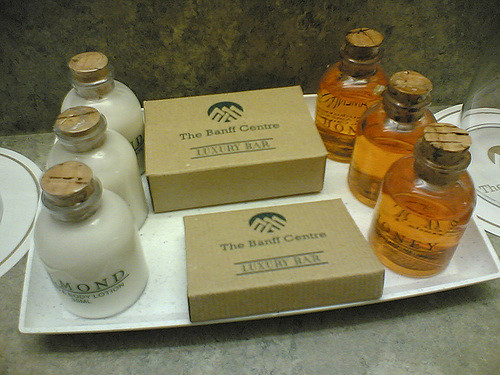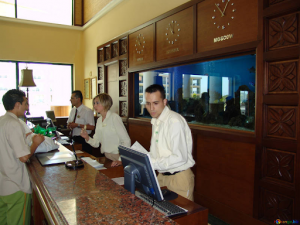Years ago, it was hard to find any hotel recycling program that truly benefited the environment; but today, with the pressure to continuously improve on environmental protection in every industry, there are many hotels pressing forward with bold initiatives to minimize their carbon footprint.
While a lot of businesses today are eager to Go Green, one fast-growing industry that could make a major contribution to our environment is the hotel and hospitality industry.
In states with a high volume of tourism, like Florida and California, the hospitality industry could make enormous contributions by simply recycling a lot of the waste their guests generate each day. And that includes the recycling of e-waste.
Today, top hotels are under more pressure than ever to provide guests with business centers that offer computer access. Hotels also want the latest and best computer systems to offer, so the older models get replaced frequently. Those models could get recycled.
And that’s just one way that hotels and others within the field of hospitality can leave a greener footprint: by contributing to the need for higher recycling rates for electronic waste.
There’s been a major push in recent years to increase recycling rates for used electronics, to keep them out of landfills. E-waste contains toxins like mercury and lead which can seep out and contaminate the soil and water, creating environmental hazards for people and wildlife nearby.
More and more hotels are discovering the positive marketing value of Going Green, an additional incentive for adding e-waste recycling to their overall solid waste removal and recycling plans.
Does a Hotel Recycling Program Improve the Environment

In Florida, tourism is one of the Sunshine State’s largest industries. Florida serves 95 million visitors a year, with more than 50% of these visitors becoming hotel guests.
And with literally millions of guests coming to Florida every year, the hospitality industry naturally produces millions of tons of waste every year. In fact, it’s been estimated that the average hotel guest contributes an estimated 2.5 pounds of trash per day. Hotel waste management is a challenge.
It’s known that the hotel industry, which operates 24 hours a day, has a challenge when it comes to separating recyclable waste from the heavy volume of trash that guests accumulate. On a daily basis, hotels generate such large volumes of waste that most of it routinely gets sent to landfills. Hotel waste management is a major issue.
But that may be changing. In recent years, hotel owners and management have become more focused on merging their waste management efforts with recycling programs. Like many other industries, the field of hospitality has recognized the positive benefits of making a stronger commitment to the environment and being able to advertise to guests their new green credentials.
In fact, estimates are that hotels have the opportunity to recycle as much as 50-60% of their total waste stream. And recycling can help hotels reduce the high cost of managing their waste.
Waste Management World has looked at some of the reasons why the hospitality industry has been reluctant to expand recycling programs, and one concern is space — namely, where to store and sort waste to be recycled when so much of the hotel property is allocated to areas where guests are, including the reception area and lobby, restaurant and banquet facilities.
And some hotels wonder if a recycling program on their premises, aiming at guests as well as workers, would succeed. Their guests may be used to doing recycling at home, but will they participate when they’re traveling?
The truth is, hotels are well positioned to become more actively involved in recycling. For one thing, a lot of the waste at hotels contains items that communities across Florida have municipal recycling programs for, including office paper, cardboard, aluminum cans, and plastic bottles.
Hotels have huge contributions to make to the environment because of that. Hotels can also form partnerships that help them achieve waste reduction and recycling goals, since there are environmental and community groups eager to help businesses accomplish that task.
More importantly, hotels are starting to recognize the financial incentives of establishing recycling programs. Some hotels have even cut their waste management costs in half by recycling.
The bottom line: an investment in a strong recycling program means a hotel can benefit from:
- Cost savings
- Solid PR
- A stronger green reputation
To make a hotel recycling program work, hotels need to keep their employees up-to-date about the best recycling procedures, and that includes frequently updating their employees on how the programs work.
They also need to monitor their recycling programs on a regular basis, carefully track the volume and types of recyclables they process, and continue to refine their recycling programs by encouraging feedback from employees and guests, making changes where necessary.
A hotel recycling program need not be complicated.
A good place to start is to walk through the hotel or motel, taking note of what type of waste is discarded in each area. For example, it could be cans, plastic containers, glass and cardboard in the Foodservice areas, or magazines, newspapers, and bottles in the lobby or public areas. It’s also relatively easy to set up user-friendly systems with clearly labeled containers or bins for collecting recyclables.
Taking those first steps goes a long way toward helping a hotel become a “smart destination” with sustainability goals.
And that hotel recycling program should include making a commitment to e-waste recycling.
Does Recycling in the Hotel Industry Include E-waste?

A proper hotel industry recycling program should include e-waste recycling. After all, hotels have both administrative offices for staff and management, and business centers for guests. Registration desks also use computers. In addition to generating recyclable content like paper, there’s a lot of electronic equipment being used in these offices.
With thousands of customers checking in each year, at a business that operates 24 hours a day, hotels are more likely to be replacing their office electronics more frequently.
And by recycling those devices, their contributions to the environment will be enormous.
The number of used electronics that people are discarding each year is soaring. As technology keeps advancing, creating newer and more sophisticated versions of older devices, consumers have been all too quick to discard the electronics they own now. That means the amount of e-waste that’s been tossed out and sent to landfills is skyrocketing.
That’s a huge environmental concern that even the United Nations has been warned about. That’s why the UN, environmental groups and governments around the world are working to promote the recycling of e-waste as the best solution.
Estimates are that the world produces up to 50 million tonnes of e-waste every year from consumers and businesses throwing out everything from smartphones to computers to household and office appliances, material believed to still be worth $62.5 billion. But only a small percentage of the e-waste — which contains valuable and reusable materials like metals and rare earth, never gets recycled.
Once a used electronic device is sent to an experienced recycling firm like Great Lakes Electronics Corporation, it keeps those devices out of landfills, and the parts with value can be used by manufacturers to create new products.
So what can the hotel industry do? Recycling is a great way to make a long-term contribution to our environment, and recycling aging office equipment and electronics should be near the top of their list.
It’s worth noting that as the world copes with a plastic waste crisis that’s also creating serious environmental problems, a number of hotels, airlines, cruise lines and restaurants have responded by minimizing the use of single-use plastic like straws and cups. Hilton Hotels made a commitment to eliminate plastic straws from its hotels altogether.
The same commitment can be made to recycling all used electronics at hotels. All it takes is a recognition of the problem that e-waste poses, and a desire to make a contribution to improving this situation.
Conclusion
Recycling in the hospital industry is important. As managers struggle with hotel waste management, establishing hotel recycling programs is a good start.
There will be clear environmental benefits for the entire community if the hospitality industry makes a firm commitment to hotel recycling programs, including the recycling of used electronics and all forms of e-waste.
Hotels should also recognize there’s strong public support for recycling, making it a good public relations move.
Electronic recycling is the specialty of Great Lakes Electronics Corporation, which has years of experience performing environmentally friendly recycling of electronic products.
Great Lakes Electronics Corporation will disassemble these items into component parts, and the ones that still have value can be sold for reuse. Other parts are used for metals recovery, and everything is recycled.
Great Lakes Electronics Corporation serves customers both large and small, from private customers to large corporations. Contact them today at 888-392-7831 to request a quote.

